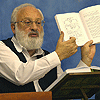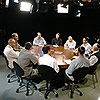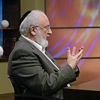 From My Facebook Page Michael Laitman 8/12/22
From My Facebook Page Michael Laitman 8/12/22
When Operation Breaking Dawn broke out last Friday, Israeli journalist Gideon Levy harshly criticized Israel in an interview for the anti-Israel Al Jazeera network. Bella Hadid, an international model of Palestinian origin and a frequent basher of Israel, quickly seized the opportunity and shared the segment with her tens of millions of followers on social media. I cannot blame Israel haters for using Israelis who routinely demonize their own country, but we need to understand the origin of the self-loathing that they feel, why the fact that they are weaponizing our enemies does not deter them, and why it does not help them. Within every Israeli, there is hatred for one’s own people; it is hatred not for the people, but for the idea that Israel represents: love of others. When we resolve this hatred, we will resolve antisemitism.
On the face of it, Mr. Levy is a courageous man of integrity, justifying his enemy at his own risk. After all, he, too, could have been hurt by the more than 1,100 rockets that the Palestinian Islamic Jihad fired at Israel. Yet, Levy is not concerned about that. Being a hero in the eyes of the world is his goal, even if it is unclear where is the heroism in the act he took here with his anti-Israeli statement on an anti-Israeli network.
What is more important is that underneath the Israel bashing, there is profound hatred for Israel. Not only Israeli Israel-bashers have it, but every Israeli feels it, and in fact every Jew has that hatred. In some, it is latent, and in some, it is blatant, but no Jew escapes this inner schism.
Self-hate has been our bane throughout the history of our people, and for a good reason. Israel represents transcending the natural human disposition to care only for oneself. Being Israel means embracing mutual responsibility and solidarity with the goal of ultimately loving others as much as one loves oneself.
It is one thing to aspire for such a goal, but it is an entirely different thing to be obligated by the world to achieve it, to feel how formidable this task is, and then face the consequences of failing at it: the hatred of the world. Not surprisingly, the majority of Jews suppress the notion of mutual responsibility and love of others, or divert it toward loving their enemy and blaming their own people, hoping it will win them their enemies’ favor, which it will not.
That struggle exists in every Jew, whether one is aware of it or not. It determines one’s relation toward the State of Israel, toward the Jewish people, and toward Israel’s enemies. Israelis who hate Israel are actually sensitive to their obligation to the world but respond to it in a counterproductive manner: They want to cut their ties to the Israeli people and its obligations. However, no Israeli can be liberated from it. Therefore, they express their resentment through hatred for the State of Israel. I feel sorry for them; they are in great distress.
Such people cannot change. They feel entitled and just, superior and self-righteous. They do not feel that they are spewing hate; they believe that they are fighting against it.
You cannot reach such people’s hearts directly. The only way to influence them is by changing the entire society around them. If all of the Israeli society increases its appreciation of the Golden Rule—which is love of others—and its manifestations, it will percolate into everyone’s hearts, and people will begin to realize that being Israel, namely setting an example of unity and solidarity, is possible, and the world really does appreciate it. In such a state, it will be easier to very gradually change the hearts of Jewish Israel-bashers.
Therefore, our goal should not be to mitigate the hatred of those who demonize the State of Israel. Our goal should be to eulogize solidarity and unity to the point of loving others as much as we love ourselves. If we operate in this way, all haters of Israel will disappear, from within and from without, and we will realize that they were only here in order to galvanize us toward strengthening our unity and setting an example of love of others for the entire world.

Image by Georges Biard (Wikimedia)
Filed under: Facebook, Israel Today - No Comments →
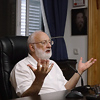 Question: Were there any spiritual languages before the appearance of Hebrew?
Question: Were there any spiritual languages before the appearance of Hebrew?
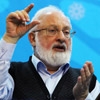
 From My Facebook Page
From My Facebook Page 

 Michael Laitman, On Quora:
Michael Laitman, On Quora:

